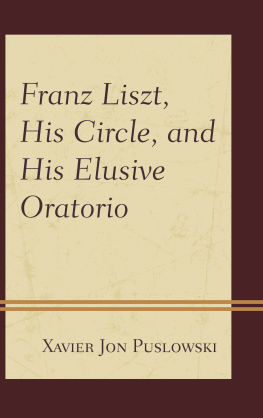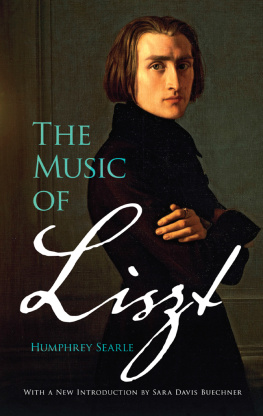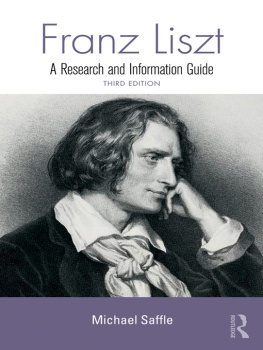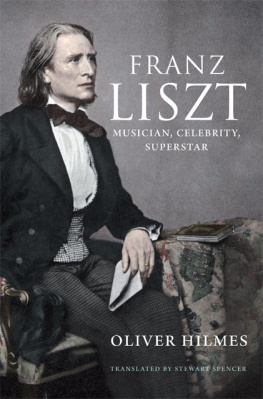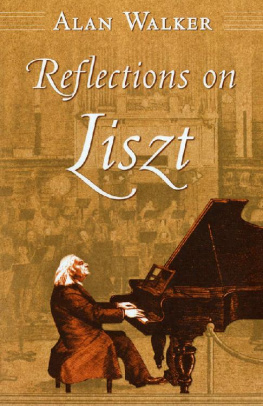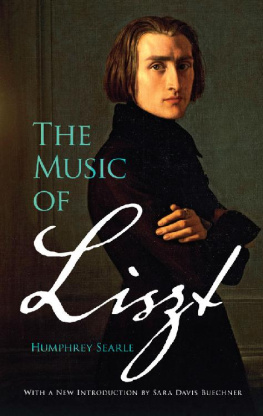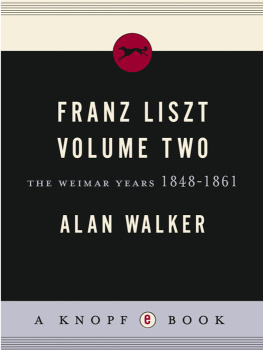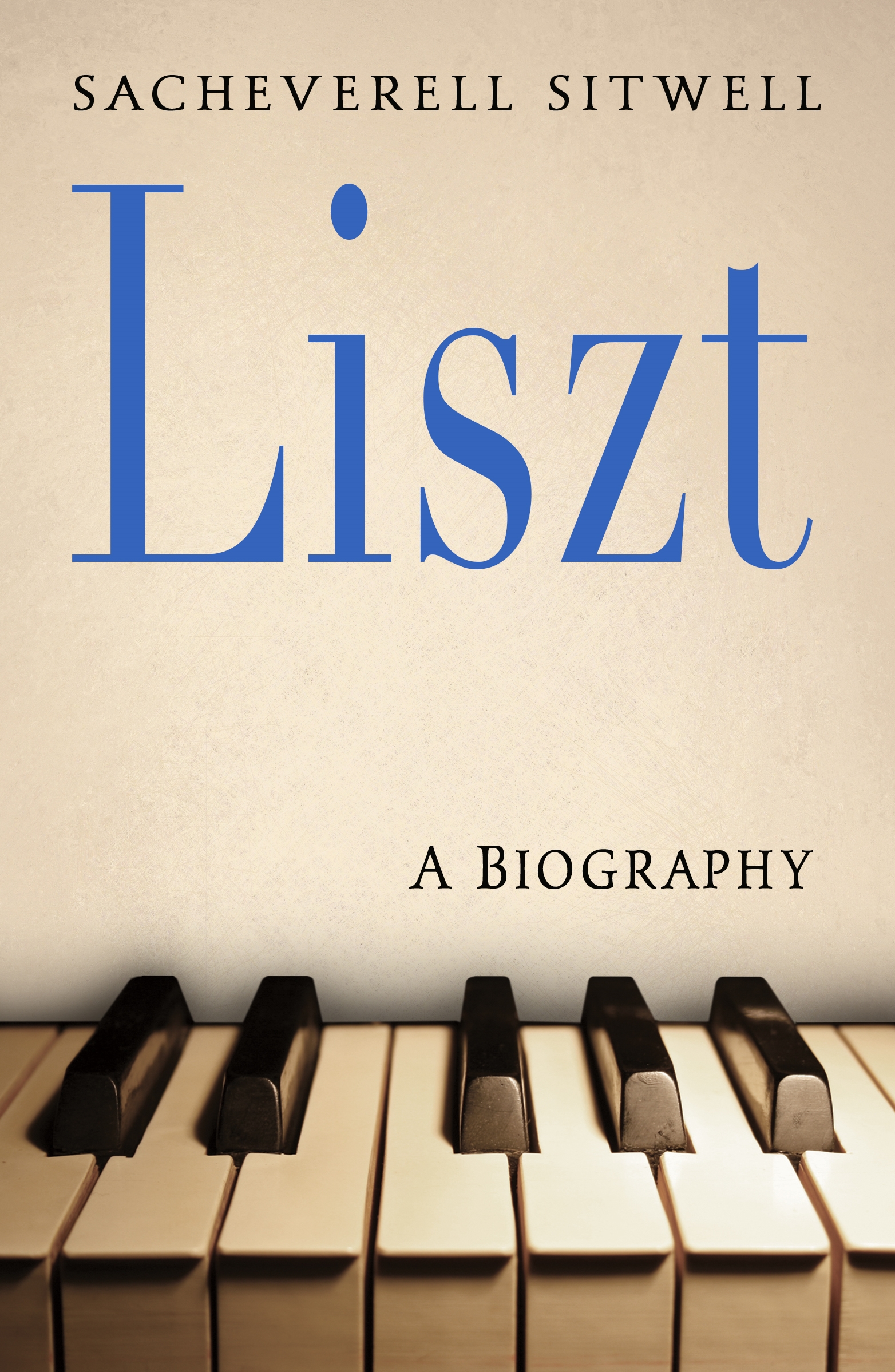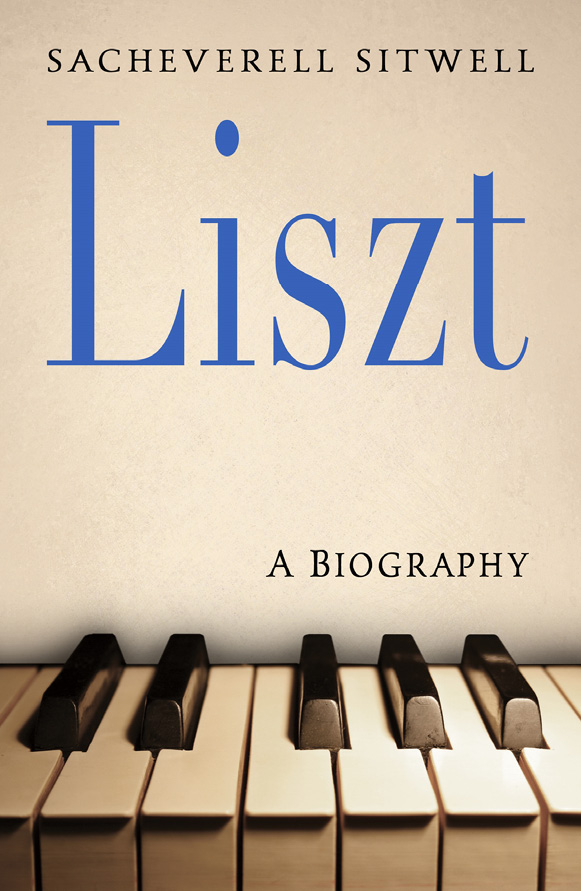Title
Sacheverell Sitwell
LISZT

Dedication
TO
CYNTHIA MOSLEY
Epigraph
The attraction of the virtuoso for the public is very like that of the circus for the crowd. There is always a hope that something dangerous may happen. M...x (Ysaye) may play the violin with M...y (Colonne) on his shoulders; or M...b (Pugno) may conclude his piece by lifting the piano with his teeth,
C laude D ebussy. Monsieur Croche , the Dilettante-hater .
Contents
Contents
Childhood and Youth
Chapter One
The year of the CometMusic and the EsterhazyBirth and origin of LisztHis first concertHe plays at Pressburg, and his musical education is guaranteed for six years
Liszt was born in 1811, the year of the Comet, a sensational, extraordinary year when talk was of nothing but War. Napoleon was waning, the disastrous Moscow campaign threw its shadows before it, and the King of Rome, the Caesarion of the Empire, appeared in the world. There was change in everything, and no permanence.
The birthplace of Liszt, though it was so near to Vienna, was on the confines of the civilized world and not far removed from the dominions of the Turk. Indeed, the Turks had receded from there. The minaret and the standard of the crescent moon had been known in those lands, but the Hungarians lived, now, in an antique, feudal peace on the very edges of the modern earth. The wars and disturbances of Napoleon can hardly have reached them, for their only connection with the world was through the insensate luxury and extravagance of their landlords. These were the Esterhazy. Their very name bespeaks that.
The Esterhazy had been made Princes in 1687, and were the chief of those Hungarian families who, on the expulsion of the Turks, were allotted gigantic estates and allowed a semi-independent condition. Their domain was some fifty miles to the south of Vienna in a characteristically Hungarian district, that, by the curious provisions of the Peace Treaty, is now divided with Austria. They had two great houses, not far apart, at Esterhaza and Eisenstadt, and lived at both in more than princely splendour. We shall see that music was not the least part of this, and that it is no matter for surprise that a great musician should have been born upon their estates, since this family had been associated with music to a quite extraordinary degree.
Eisenstadt was the first great palace of the Esterhazy, but Prince Nicholas Joseph, 1714-1790, who had travelled to Italy and France, was not satisfied and began to build Esterhaza, a few miles away from it. The circumstances of his life are hardly credible, but its glitter and brilliance were decidedly a part of the Orient. The palace and gardens of Esterhaza were on an immense scale, and he kept open house there, to the extent that it became equivalent to what a modern hotel would be, were its owner a philanthropist. Every foreign visitor to Vienna made a point of staying there for three or four days. We may doubt whether Esterhaza contained much in the way of works of art, but the gardens must have been delightful, and the horses, the carriages, the liveries were splendid.
However, the chief recreation of the Prince was in music, and this was, also, the amusement of his guests. There were daily concerts, and German or Italian opera on alternate nights, with an occasional musical piece played by the marionettes, or fantoccini. For all this, the great Haydn was responsible, and he was employed at Esterhaza for thirty years, until the death of the Prince. During this time he wrote an infinity of music, the fame of which spread, by degrees, to the extreme limits of Europe. The atmosphere was of music, and of music in many different forms.
For it may be said that during these years Haydn started the symphony and the string-quartet as we know them. And his theatrical music, which has been unduly neglected, cannot have been the least delightful part of his activity. Indeed, if we wish to regret music of his that is never heard, we may think of his comic operas and vaudevilles, of a Chinese pantomime for marionettes, of the marches for the Esterhazy Grenadiers; and, when all these are added to his known and popular compositions, it must be conceded that the rumours and echoes of fine music may have linger ed, twenty years after he left the place, until Liszt was born.
After the death of Prince Nicholas Joseph, in 1790, his successor, Prince Nicholas, 1765-1833, dispensed with the services of Haydn and allowed him to leave Esterhaza and proceed abroad, into the world. The great period of his fame was at hand. He paid two visits to England, wrote the Twelve Salomon Symphonies, and became the musical idol of Europe.
But the Esterhazy, though to a diminished extent, still continued their patronage of the art. Prince Nicholas had, by now, transferred his residence to Eisenstadt, which was old-fashioned and which he entirely remodelled in the classical taste of that day. It is an enormous square building, flanked by seven towers, and encircled with a moat. It was this same Prince Nicholas whom Napoleon invited the Magyars to elect as King of Hungary in 1809, instead of the Habsburgs. But the Prince, true to his family character of loyalty to that dynasty, refused the honour. He was equally true to the Esterhazy tradition of ostentation and extravagance, for it is reported that his immense expenditure on building and on the arts impoverished his family for two generations. His connection with music is that Johann Nepomuk Hummel, the greatest piano-virtuoso of his day, was Kapellmeister at Eisenstadt from 1804 till 1811. Hummel, it will be remembered, was a pupil of Mozart at the age of seven years, and was, by the time he lived at Eisenstadt, the finest player of his day. There are, also, records of Cherubini having visited Eisenstadt for some performances of his works during his stay at Vienna in 1805 and 1806. So it will be seen that music was still the interest of the family.
To complete the picture of the Esterhazy, we may add that it was the son of this Prince, Paul Anthony, 1786-1866, who was Ambassador in London and wore the famous suit of diamonds at the Coronation of George IV. He married the daughter of Lord Jersey, and it is said that she pined away in her adopted country because she had too few quarterings and so the nobles of Hungary could not spe ak to her. But the extravagances of Prince Paul Anthony brought about the final ruin of his family, and they have never recovered from him.
His history lies beyond our subject, but his father, the patron of Hummel and Cherubini, was in the full blaze of his splendour in the year 1811. Among his numerous retainers there was a land-steward, called Adam Liszt, whose father had filled a similar post and had, therefore, some hereditary claims to his Princes consideration. This Adam Liszt was promoted, in 1810, to the post of steward of the Esterhazy properties at the little town of Raiding, and, before going to live there, he married Anna Lager, or Laager, a native of Lower Austria, with German blood in her veins. His own family, like all Magyars not of the peasant class, was originally of noble origin, and persons of their name, notably a Bishop, occur as far back as the early sixteenth century. The connection between them and Adam Liszt cannot be traced, but there is no reason to doubt its truth.


